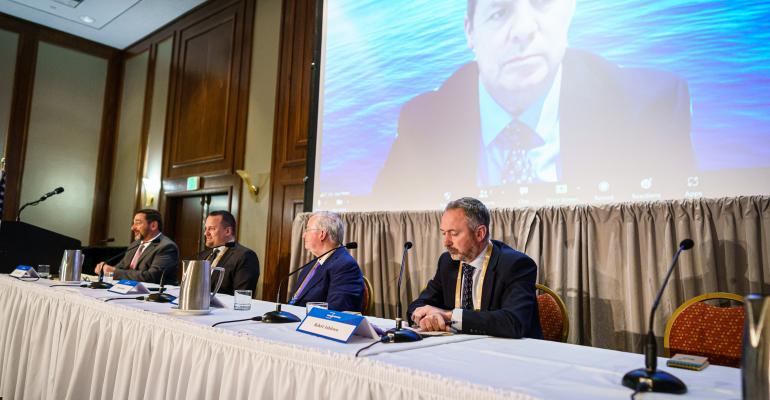Moderator Roy Bleiberg, Vice President, Business Development, ABS, noted the advance of technology across the sector from autonomy, remote control and the use of 3D plans in construction, as well as the drivers behind these changes like corporate ESG.
“Even with all the digitalisation of technology that we're seeing, it really does come down to the seafarer. They’re the ones that are really facing a lot of these challenges that we're going to have in the future.
“As [USCG Assistant Commandant for Prevention Policy] Admiral Mauger mentioned earlier, we really do have to attract the best and the brightest to the industry. Whether it be working at sea, or whether it be working ashore, we have to bring those engineers and naval architects to the industry. We must acknowledge the challenge of how much risk is actually going to be managed ashore versus managed at sea is probably going to change in the future,” said Bleiberg.
Jason Zuidema, Executive Director, North American Maritime Ministry Association (NAMMA), said that connectivity had become a priority for seafarers through the pandemic, and had been raised even higher for some seafarers due to Russia’s invasion of Ukraine.
“There's about 100 International vessels in that zone with another perhaps 40 tugboats as well, in specific in the Mariupol area, under extremely difficult circumstances. Another seven vessels with about 140 crew are running out of supplies, this is a developing humanitarian crisis and it's very difficult to do anything about it,” said Zuidema.
Russian and Ukrainian seafarers worldwide, along with their crewmates, are under immense pressure as they think about their own families, especially Ukrainians thinking about family members who may be fleering war, said Zuidema.
Robert Ashdown, Secretary General, International Association of Classification Societies (IACS) said that the three elements of ESG need to be given parity, and on the social sustainability side, seafarer working and living conditions are key and not up to scratch on too many ships.
“Seafarer working editions isn't traditionally an area that class engages is, but of course many of class societies do MLC audits and although it's not class’s role to demand the industry takes action in areas outside of our scope, I do think that the experience and knowledge and expertise found within the societies can be very valuable to owners as they try and meet some of their ESG challenges.
“Of course, the scope of class is not fixed. Less than 50 years ago, we weren't into environmental protection measures as part of IACS productivity, that's very much the case now. So maybe in the future, you will see a social dimension added to IACS’s work as well,” said Ashdown.

